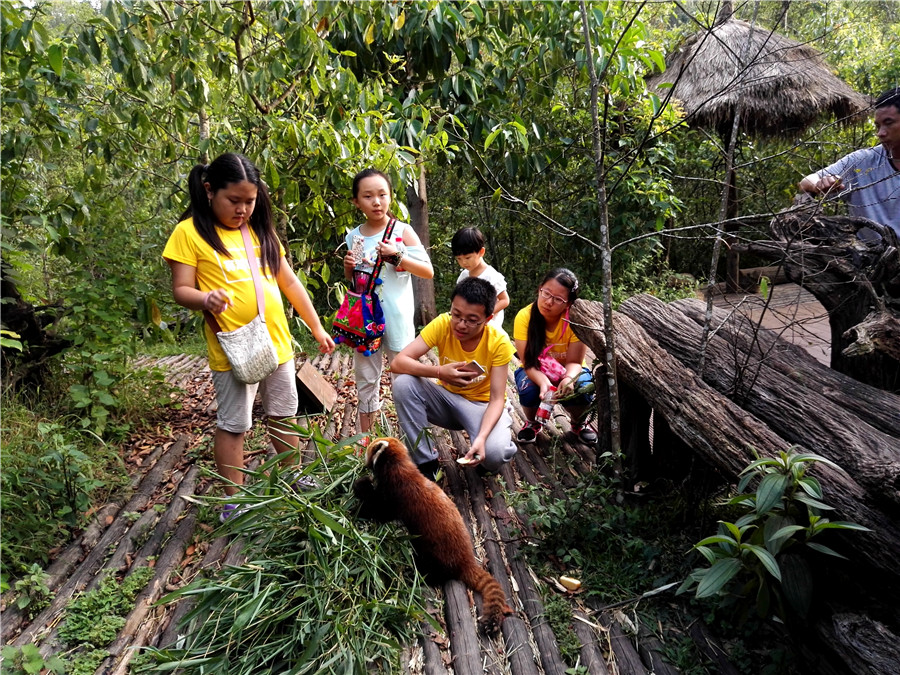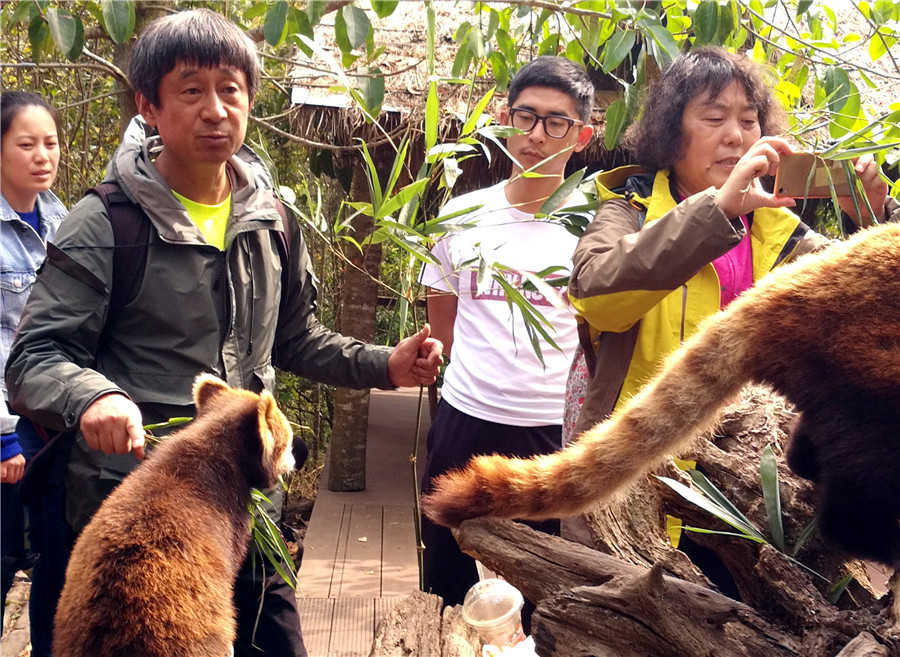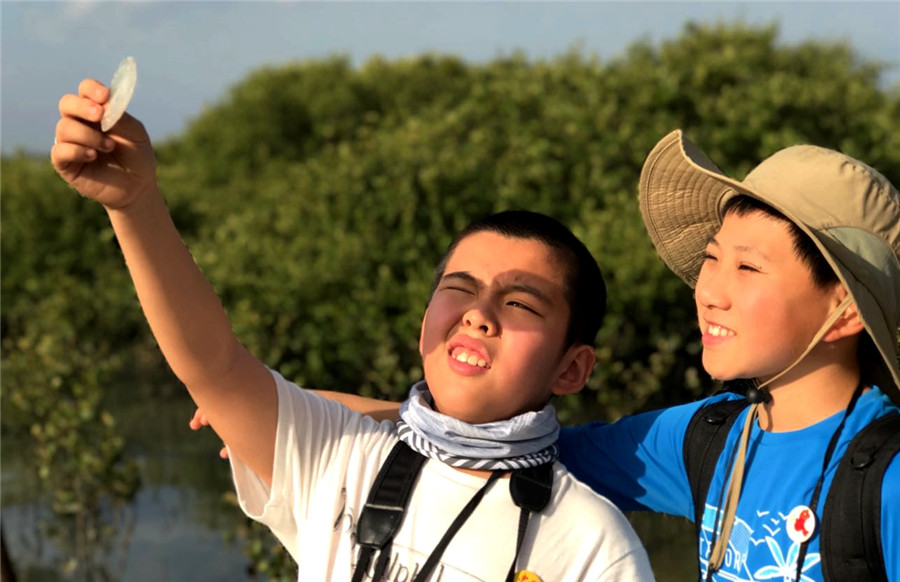
Schoolchildren interact with a red panda at the Pu'er Sun-River National Park in Pu'er city, Yunnan province. [Photo provided to China Daily]
Children nationwide are being encouraged to interact with the living world to foster eco-awareness and protection. Li Yingqing reports from Kunming, with Li Hongyang in Beijing.
Since 2016, a growing number of parents nationwide have signed their children up for extracurricular nature classes during the summer and winter vacations, in the hope they will play with animals and plants rather than smartphones and iPads.
The courses are usually provided by private companies, and the students' subsequent behavior and interests suggest that such classes can help them develop respect for nature and promote a sense of environmental awareness and stewardship.
Classes, usually held in forests and parks, often include treks through forests by day and night to observe animals in their natural habitats, and tracking and identifying them via the traces they leave during their daily lives. Students are sometimes encouraged to make artworks from organic materials.
The rising number of nature education institutions suggests that the sector is becoming increasingly popular nationwide.
Last year, about 400 nature educational institutions took part in a themed forum in Chengdu, Sichuan province, hosted by the China Nature Education Network - an alliance of 20 eco-groups and environmentalists - and the tech giant Alibaba. In 2017, about 170 institutions attended the forum.
However, a survey conducted by the network shows that while the sector may be becoming increasingly popular, it is far from prosperous, despite average weekly fees of 700 to 2,100 yuan ($102 to $305) per person.
Last year, of 398 institutions surveyed, only 215 made a profit, while 95 broke even, and the other 88 made a loss. More than half the teachers surveyed had majored in management, education and biological sciences.
They said their main teaching tasks included showing children how to take part in outdoor activities, explaining natural science, promoting the idea of environmental protection, and teaching students about the relationship between humans and nature.
About 60 percent of those attending were primary school students, their parents and other family members, the survey showed.

He Yiran, a teacher at the Pu'er Red Panda Manor Forest Experience Center, explains the habits of red pandas at the park. [Photo provided to China Daily]
Night treks
In January, Li Runyue, a primary school teacher from Kunming, Yunnan province, took about 20 students on a seven-day nature program in the Sun-River National Park in Pu'er city, Yunnan.
The program was organized by the Pu'er Red Panda Manor Forest Experience Center, a nature education facility for people of all ages.
Since it was established in November 2017, the center has offered a host of forest-based activities, including night treks, handicrafts, painting classes and tea ceremonies related to the renowned Pu'er brand grown in the area.
Li said her students, ages 8 through 9, had become more independent and less timid after they walked through a forest at night.
"Their task was to find insects hiding in the forest. The children were excited because they found many insects they had seen in their textbooks. After walking for two hours, we decided to turn off our flashlights and enjoy the moonlight," she said.
She noted that without the flashlights, the children felt their surroundings were quieter and their ears had become more sensitive to the sounds of nature.
They also bathed in the beautiful moonlight that silhouetted the trees and students. On the return journey through the woodland, the children loudly recited poems about the moon.
"After we returned to our rented cottage in the forest park, the electricity was accidently cut off. At first, the students were scared, and some even screamed. But they calmed down very quickly because they remembered the wonderful experience they had just had, which made them happy and gave them courage," Li said.
"Natural beauty is raw and harmonious, which can inspire children's artistic imaginations and improve their observational abilities. They can also learn that everything in nature is trying to grow strong, so they need to protect nature and love it."
Jiang Yalin's 9-year-old son was one of the students who took part in Li's night class. She said the boy's analytical abilities improved noticeably as a result.
"I registered him for the class because he showed great interest in biology, and I want him to develop this hobby into a career in the future. This course was instructive and effective. The teachers asked a series of questions before setting tasks, and the children needed to find the answers by themselves and then provide explanations from the natural world," Jiang said.
He Yiran, a teacher at the panda center, said the role of a forest educator is to gain an appreciation of nature, understand the diversity of living things and appreciate the greatness of life and nature by interacting with other people in the forest setting.
"Sometimes children like to catch bugs, but we persuade them to release them, and repeatedly emphasize the importance of environmental protection," he said.

Children look at a shell in Hainan province in 2017. [Photo provided to China Daily]
Values
Luo Peng, founder of EcoAction, a nature education school in Beijing, who has a master's in biology from the Institute of Zoology at the Chinese Academy of Sciences, said her work aims to foster changes in values and mindsets.
She said that in addition to helping children learn about and respect different ways of living - including those of insects, animals and even different groups of people - the most important thing is to let them reflect on the effect humans have on nature.
"It's not enough to give them knowledge; we also need to provide discourse that teaches them moral values, such as how to think about the relationship between nature and humans," she said.
One of EcoAction's courses requires children to find living traces of wild pandas in Liziping Nature Reserve in Shimian county, Sichuan province. The children can search for the animals either via wireless radio (which is connected to GPS necklaces round the animals' necks) or by spotting their feces.
"Through the hands-on classes, we show the children how to protect pandas more easily. For example, some local residents poach rare species or cut down trees to make money, so developing tourism (thereby providing alternative income streams) may be a good way of solving this dilemma," Luo said.
"During the classes, we encourage the children to consider different ways of solving problems. Through this, they can understand that striking a balance between humans and nature is difficult, but important. We hope that one day in the future, when they become decision makers, they will take the environmental and ecological effects of their actions into consideration."
Luo started her company in 2013, and to date, she has received many "precious rewards", such as positive feedback from the students and reading their discussions on social media platforms, which makes her feel her work is valuable. In addition, one of her students chose biological science as a major at the University of Toronto.
Meanwhile, after attending a course in Wild Elephant Valley, Xishuangbanna Dai autonomous prefecture, Yunnan, eight of Luo's former students made a public appeal to their peers and teachers at an international high school in Qingdao, Shandong province, to call for an end to animal shows in nature parks.
Luo said she hopes her efforts will encourage more young people to pay attention to the environment and ecological health.
"I think my original aim in starting the school will have been achieved if they learn how to respect nature, respect different groups and reflect on roles they can play in protection work. I hope that they can find the ways and wisdom to live harmoniously with nature in the future," she said.
|








7740f3b5-9ecb-438e-9052-76cb2d4bb671.jpg)

